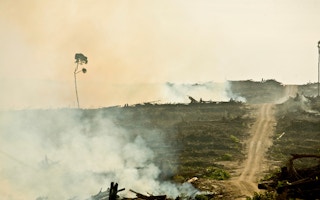The world’s largest palm oil trader, Singapore-headquartered Wilmar International, has hatched a new plan to eliminate deforestation from its supply chain following sustained pressure from green groups.
To continue reading, subscribe to Eco‑Business.
There's something for everyone. We offer a range of subscription plans.
- Access our stories and receive our Insights Weekly newsletter with the free EB Member plan.
- Unlock unlimited access to our content and archive with EB Circle.
- Publish your content with EB Premium.
Wilmar is to map and monitor its suppliers using satellites, giving a clear picture of their activities on the ground for the first time. If suppliers are found to be clearing forest, they’ll be immediately dropped from Wilmar’s supply chain, the company pledged in a statement released this week.
The firm has also said it would engage with suppliers found to be clearing forests to avoid creating a “leakage market” of farmers who continue to deforest after suspension.
Wilmar supplies palm oil—the world’s most widely consumed edible oil—to all of the big consumer goods companies that promised to be deforestation-free by 2020 in a landmark commitment made almost a decade ago.
It was the first palm oil company to commit to stop clearing forests in 2013, and bolstered its sustainability policy two years ago. But the company has been continually linked to illegal forest clearing through its suppliers.
Last month, non-government organisation (NGO) Greenpeace scaled Wilmar’s refineries in Indonesia in protest against the company’s ties to deforestation and slammed a commitment Wilmar made in October to have a deforestation-free supply chain by 2020, saying the pledge did not go far enough to ensure its suppliers would comply.
But Greenpeace said Wilmar’s new commitment is a “potential breakthrough” for the palm oil industry, as the use of satellites will make it impossible for Wilmar or its suppliers to get away with forest clearing undetected.
The NGO said it would monitor Wilmar’s progress, and suspend its publicity campaign against the company to give it space to implement the plan.
Greenpeace said that Wilmar’s commitment puts pressure on the rest of the sector, including other big palm oil companies such as Golden Agri Resources and Musim Mas, which it says continue to source oil from suppliers linked to deforestation.
The news emerges a week after Norway became the first country to introduce a ban on palm oil.
“
We encourage Norway to avoid being blinded by emotion and instead to conduct objective analyses, so that their good intention to fix this problem does not get displaced, and in turn, cause bigger problems elsewhere.
Darrel Webber, chief executive, Roundtable on Sustainable Palm Oil
The move, designed to sever the country’s links to tropical deforestation, will mean the Northern European country will no longer source palm oil for use in biofuels by 2020.
The move was praised by some environmentalists who hope other countries will follow suit to apply more pressure on the palm oil trade to shift to sustainable practices.
“The Norwegian parliament’s decision sets an important example to other countries and underlines the need for a serious reform of the world’s palm oil industry,” said Nils Hermann Ranum of green group Rainforest Foundation Norway.
The palm oil industry’s largest sustainable certification body has responded by arguing that Norway’s ban could cause unintended consequences, pushing deforestation elsewhere.
Darrel Webber, chief executive of the Roundtable on Sustainable Palm Oil (RSPO), told Eco-Business: “We believe that moves such as this stem from good intentions. However, we encourage Norway to avoid being blinded by emotion and instead to conduct objective analyses, so that their good intention to fix this problem does not get displaced, and in turn, cause bigger problems elsewhere.”
Webber added that RSPO is working with members to halt deforestation and improve practices, and a “concerted global effort” was needed to root deforestation out of the industry.








